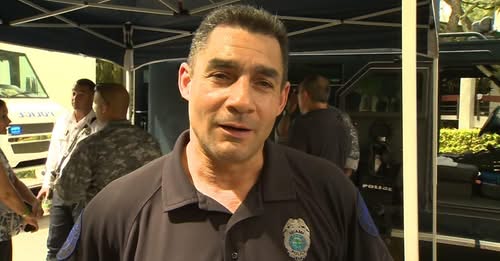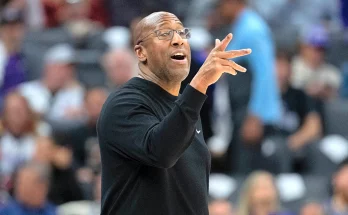The recent arrest of a former Miami Heat security officer, who also served as a retired Miami police officer, on charges related to transporting and transferring stolen goods across state lines, has sent shockwaves through the local community and sports world alike. This case is especially striking because it involves an individual who once held positions of trust and responsibility in both law enforcement and professional sports security—fields where integrity and commitment to public safety are paramount. The allegations against him highlight complex issues around corruption, breaches of trust, and the vulnerabilities within systems designed to protect valuable assets. The implications extend beyond this individual, raising important questions about oversight, accountability, and the mechanisms that prevent and detect criminal activity within organizations that are expected to uphold the law.
The Miami Heat organization has long been known for its strict security protocols and dedication to maintaining a safe environment for players, staff, and fans. Security officers working for such high-profile sports teams carry the critical responsibility of protecting not only the people inside the arena but also valuable equipment and merchandise that hold significant monetary and sentimental value. The involvement of a former security officer in criminal activities related to stolen goods undermines the confidence placed in these protective roles and forces organizations to re-examine their vetting and monitoring processes.
Equally troubling is the fact that this individual was also a retired police officer from the Miami Police Department, an institution that demands the highest ethical standards from its officers. Police officers are entrusted with enforcing the law, protecting citizens, and serving as role models in the community. When a former officer is implicated in criminal behavior, it casts a shadow over the profession and contributes to public mistrust of law enforcement. This case, therefore, resonates on multiple levels, intertwining issues of criminal justice, public safety, and professional integrity.
The charges of transporting and transferring stolen goods in interstate commerce suggest that the alleged criminal activities were not limited to local operations but involved a wider network that spanned across state boundaries. This interstate aspect elevates the seriousness of the case because it invokes federal jurisdiction, which often comes with more severe penalties and greater resources devoted to investigation and prosecution. Transporting stolen goods across state lines is a federal offense designed to combat trafficking and organized crime, and it reflects the gravity with which such actions are viewed by the justice system.
The investigation that led to the arrest of the former security officer likely involved cooperation between multiple law enforcement agencies, including federal investigators, local police, and possibly private security teams. Cases like this typically require detailed surveillance, undercover operations, and extensive gathering of evidence such as transaction records, communications, and physical recovered goods. The complexity of these investigations illustrates the challenges authorities face in dismantling criminal networks that exploit trusted positions for illicit gain.
One of the crucial elements to consider in this case is the motivation behind the alleged crimes. While the full details have not been publicly disclosed, it is often the case that individuals with insider knowledge or access to secure environments exploit these advantages to facilitate theft and resale of stolen items. In the context of a sports team, stolen goods could range from merchandise, memorabilia, and electronics to more critical equipment. The resale of such items on black markets or through illicit channels not only results in financial losses but can also damage the brand and reputation of the organization involved.
Furthermore, the involvement of a former police officer in this scheme adds a layer of complexity related to the abuse of power and insider knowledge. Such individuals often have a deep understanding of law enforcement procedures, which can be exploited to avoid detection or manipulate investigations. This breach of ethical standards is particularly damaging to community trust and the moral fabric of public institutions. It raises concerns about the effectiveness of background checks, ongoing monitoring, and accountability mechanisms within both police departments and private security firms.
The Miami Heat organization is expected to respond swiftly and transparently to the allegations to maintain public confidence. Addressing such incidents requires not only cooperation with law enforcement but also internal reviews of security protocols and personnel practices. Organizations must evaluate how a trusted employee was able to allegedly commit such offenses without earlier detection and implement measures to prevent future occurrences. This could include enhanced surveillance systems, more rigorous background checks, regular audits, and fostering a culture of integrity where employees feel empowered to report suspicious behavior.
From a legal perspective, the former officer faces serious consequences if convicted. Transporting and transferring stolen goods in interstate commerce is a felony under federal law, punishable by significant fines and imprisonment. The prosecution will likely present evidence showing the chain of events, the scope of the criminal activity, and the defendant’s role in orchestrating or facilitating these acts. The defense may seek to challenge the evidence or argue mitigating circumstances, but the burden rests on proving guilt beyond a reasonable doubt.
This case also underscores the importance of public awareness and vigilance. Communities rely on law enforcement and security personnel to protect their safety and property, and when those entrusted with these responsibilities violate that trust, it can have far-reaching effects. Public institutions and private organizations alike must continue to strive for transparency, accountability, and ethical conduct to restore and maintain confidence.
In addition, this incident may prompt broader discussions about the intersection of law enforcement and private security roles. Many retired police officers transition into security positions for private companies, leveraging their experience and training to contribute to safety efforts. While this practice has many benefits, it also necessitates careful oversight to ensure that past behavior is consistent with the standards expected in new roles. Continuous education, monitoring, and evaluation are essential to uphold these standards.
As more details emerge from the ongoing investigation and any ensuing legal proceedings, the community will be watching closely to see how justice is served and what lessons are learned. The Miami Heat, law enforcement agencies, and other stakeholders will likely review policies and practices to prevent similar incidents in the future. The goal must be to safeguard the integrity of organizations and maintain the trust of the public they serve.
Ultimately, the arrest of a former Miami Heat security officer and retired Miami police officer on charges of transporting and transferring stolen goods in interstate commerce is a sobering reminder of the vulnerabilities that can exist even in trusted positions. It highlights the necessity for robust systems of oversight and accountability, the critical importance of ethical conduct in law enforcement and security roles, and the ongoing challenge of combating criminal activity that exploits insider access. While the individual involved faces the consequences of the law, the broader implications will continue to shape conversations about trust, security, and justice in communities everywhere.


